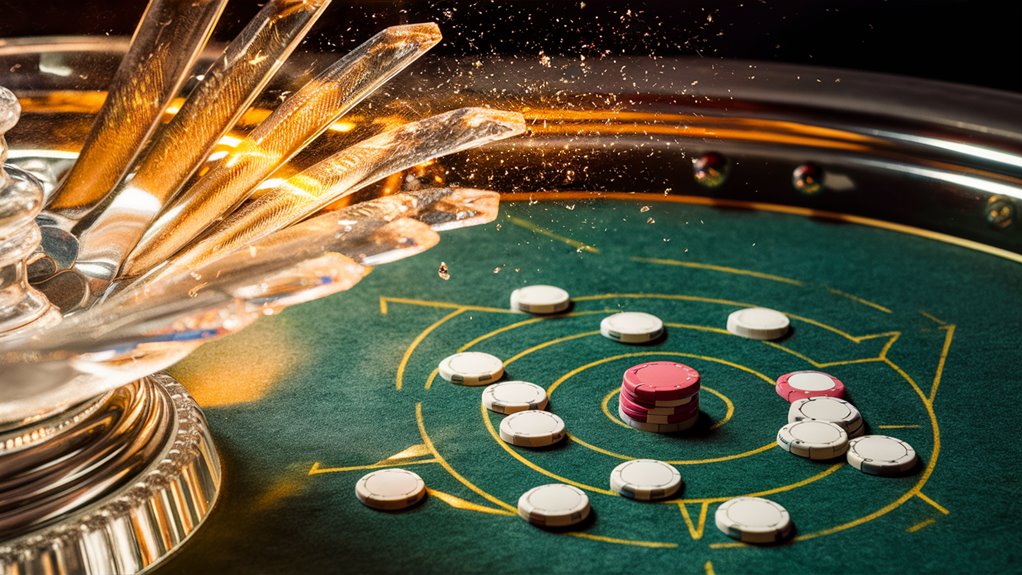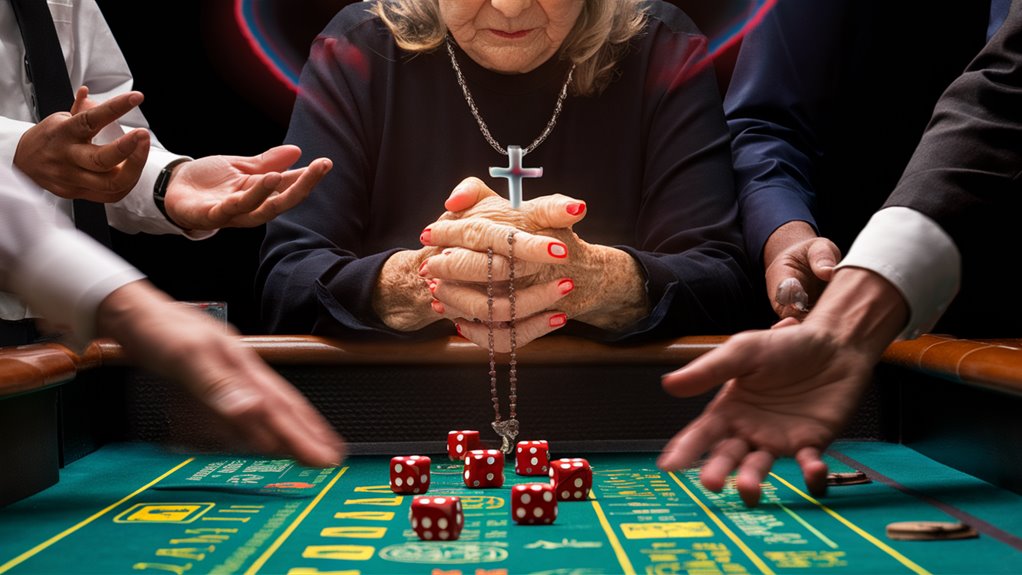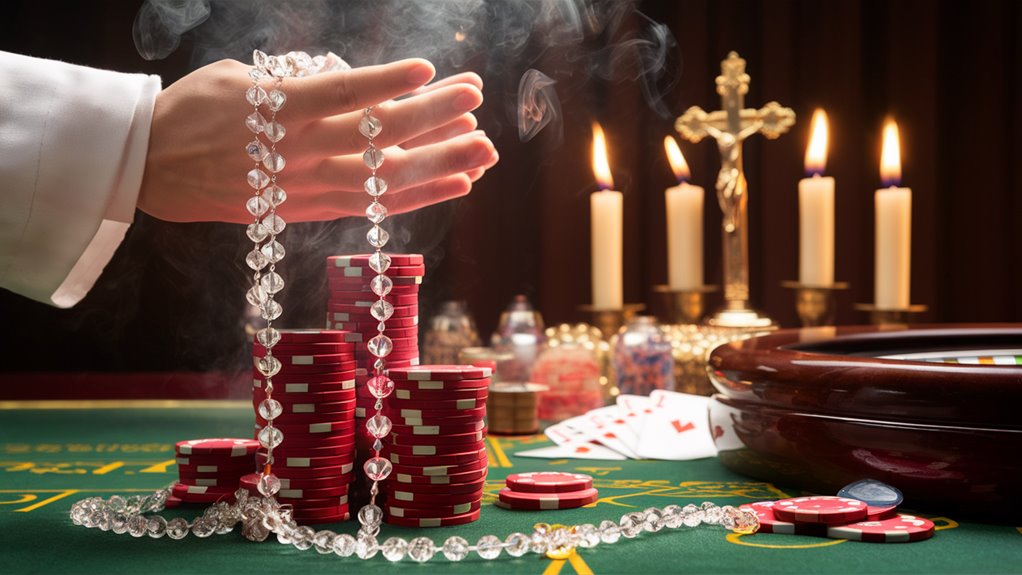Divine Symbolism in Gambling: A Comprehensive Analysis
The Sacred and Statistical Intersection
Religious symbolism and gambling mathematics create a fascinating dichotomy in casino gaming. While many players seek divine intervention in their betting pursuits, the mathematical principles governing games of chance remain unwavering. The house edge operates independently of spiritual beliefs, following strict probability laws.
Religious Elements in Casino Games
Sacred numerology appears extensively throughout casino games:
- The roulette wheel numbers sum to 666
- Card designs feature medieval Christian imagery
- Slot machines incorporate ancient religious symbols
- Table layouts mirror Gothic architectural patterns
Statistical Reality vs. Spiritual Beliefs
Mathematical probability remains constant regardless of religious practices:
- Random number generation follows precise algorithms
- Expected value calculations determine outcomes
- Statistical variance operates independently
- Probability theory supersedes supernatural influence
Religious Perspectives on Gambling
Most faith traditions maintain clear positions on gambling:
- Orthodox views generally discourage games of chance
- Religious authorities warn against mixing faith with betting
- Spiritual leaders advocate separation of worship and wagering
- Sacred texts often address risks of gambling behavior
#
Frequently Asked Questions
Q: Can prayer influence gambling outcomes?
A: Statistical probabilities remain unchanged by spiritual practices.
Q: Why do casinos use religious symbols?
A: Religious imagery serves decorative and cultural purposes only.
Q: Is gambling considered sinful in major religions?
A: Most mainstream faiths discourage or prohibit gambling activities.
Q: How do sacred numbers appear in casino games?
A: Many games incorporate religious numerology in their design elements.
Q: Can faith-based systems beat the house edge?
A: No betting system, including those based on faith, can overcome mathematical house advantages.
Sacred Numbers in Casino Games

Sacred Numbers in Casino Gaming: The Hidden Symbolism
The Significance of Sacred Numerology in Modern Gambling
Sacred numerical patterns and religious symbolism have profoundly influenced the structure and design of modern casino games.
The intersection between spiritual numbers and gambling mechanics creates a fascinating layer of meaning beneath the surface of popular casino entertainment.
Lucky Seven and Divine Numbers
The number seven, considered sacred in numerous religious traditions, dominates slot machine combinations and dice games.
This powerful digit appears frequently in winning combinations, while the number three, symbolizing divine trinity, manifests throughout various card game combinations and betting structures.
Roulette’s Mathematical Mysticism
Roulette wheel symbolism reveals intriguing numerical patterns. The sum of numbers 1-36 equals 666, a number of profound Biblical significance.
The game’s structure incorporates multiples of twelve, reflecting ancient religious groupings such as the twelve disciples and twelve tribes of Israel.
Sacred Numbers in Card Games
Baccarat’s perfect nine mirrors ancient cosmological systems, while blackjack’s twenty-one represents completion in numerical symbolism.
The coveted royal flush in poker, comprising five cards, connects to significant religious numerical patterns.
Frequently Asked Questions
Q: What’s the significance of the number seven in casino games?
A: Seven represents divine perfection in many traditions and appears prominently in slots, craps, and various casino game winning combinations.
Q: How does roulette incorporate sacred numbers?
A: Roulette’s number sequence totals 666 and uses multiples of 12, reflecting Biblical numerology.
Q: What religious symbolism exists in card games?
A: Card games feature numerous sacred numbers, from baccarat’s nine to blackjack’s 21 and poker’s five-card combinations.
Q: Why are these numbers considered sacred in gambling?
A: These numbers derive significance from religious and cultural traditions, influencing game design and player psychology.
Q: How do sacred numbers affect modern casino gaming?
A: Sacred numbers shape game mechanics, influence betting patterns, and contribute to players’ perceptions of luck and probability.
Religious Symbols at the Table
Religious Symbols in Casino Gaming Design
Sacred Geometry and Symbolism at Gaming Tables
Religious iconography and sacred symbols permeate modern casino gaming tables through intricate design elements.
Traditional symbols like crosses, crescents, and spiritual motifs appear as decorative features on chips, cards, and table surfaces.
Modern playing cards trace their lineage to Tarot’s religious imagery, where suits symbolized distinct spiritual stations and divine concepts.
Sacred Architecture in Gaming Equipment
The roulette wheel’s design incorporates significant architectural elements from religious structures.
The wheel’s spoke pattern mirrors Gothic cathedral rose windows, while its circular layout reflects Buddhist mandala patterns.
Betting positions create geometric arrangements that parallel sacred architectural proportions found in temples and churches.
Baccarat table designs seamlessly integrate Asian spiritual symbols, combining Buddhist and Taoist imagery to enhance the gaming experience.
Ritualistic Elements in Casino Gaming
Gaming table configurations reflect traditional altar arrangements, positioning dealers in ceremonial spaces reminiscent of religious officiants.
Dice game rituals often mirror religious practices, with players adopting prayer-like gestures during gameplay.
This integration of sacred elements transforms casino gaming into a quasi-religious experience, creating an atmosphere of reverence and ceremony.
Frequently Asked Questions
Q: What religious symbols are commonly found in casino gaming?
A: Common symbols include crosses, crescents, mandalas, and Asian 블랙잭정확도향상 spiritual motifs incorporated into table designs and gaming equipment.
Q: How does roulette wheel design reflect religious architecture?
A: Roulette wheels feature spoke patterns similar to cathedral rose windows and circular designs reminiscent of Buddhist mandalas.
Q: What’s the connection between playing cards and religious imagery?
A: Modern playing cards evolved from Tarot cards, which originally featured religious symbolism and spiritual representations.
Q: How do baccarat tables incorporate religious elements?
A: Baccarat tables often feature Buddhist and Taoist symbols of fortune and prosperity integrated into their design.
Q: What makes casino gaming layouts similar to religious spaces?
A: Gaming tables mirror altar configurations, with dealers positioned similarly to religious officiants and geometric patterns reflecting sacred architecture.
Prayer as a Betting Strategy

Prayer as a Gambling Strategy: Understanding the Psychology and Reality
The Psychology Behind Prayer in Gambling
Prayer in gambling represents a complex intersection between faith and risk-taking behavior. Gamblers frequently turn to spiritual practices during moments of uncertainty, seeking divine intervention despite the mathematical impossibility of influencing random outcomes.
This widespread phenomenon stems from humanity’s deep-rooted desire to find meaning and control in unpredictable situations.
The Psychological Comfort Mechanism
Prayer functions primarily as a psychological coping tool rather than an effective betting strategy. Research shows that gambling prayer provides:
- Emotional regulation during high-stress situations
- Anxiety reduction before placing bets
- Perceived control over random outcomes
- Enhanced confidence in decision-making
Religious Perspectives on Gambling Prayer
Traditional religious teachings typically discourage using prayer for gambling purposes. Most theological frameworks emphasize:
- The inappropriate nature of seeking divine intervention for personal gain
- Warnings against testing spiritual providence
- The incompatibility between gambling and authentic spiritual practice
- The importance of responsible financial stewardship
Mathematical Reality vs. Spiritual Appeals
The mathematical principles governing gambling remain constant regardless of spiritual practices:
- House edge maintains its statistical advantage
- Random number generation operates independently
- Probability calculations stay unaffected by prayer
- Gaming outcomes follow predetermined mathematical models
Frequently Asked Questions
Q: Can prayer improve gambling odds?
A: No, statistical probabilities remain unchanged by prayer or spiritual practices.
Q: Why do people pray while gambling?
A: Prayer provides psychological comfort and a sense of control in uncertain situations.
Q: Does praying affect random number generation?
A: No, random number generators operate independently of any external spiritual influences.
Q: How do religions view gambling prayer?
A: Most mainstream religions discourage using prayer for gambling purposes.
Q: Can prayer help with responsible gambling?
A: While prayer may provide emotional support, it shouldn’t be relied upon as a gambling strategy.
The Ethics of Faith-Based Gambling
The Ethics of Faith-Based Gambling: A Comprehensive Analysis
Understanding the Theological Dilemma
Faith-based gambling creates complex ethical challenges at the intersection of spiritual practice and games of chance.
The combination of religious devotion and gambling activities raises fundamental questions about proper spiritual conduct and the appropriate use of prayer.
Key Ethical Concerns
Divine Intervention in Gaming
Religious gambling practices often involve seeking divine assistance for financial gain through games of chance.
This raises significant theological concerns about the appropriate relationship between faith and material pursuits.
Spiritual Integrity
The merger of prayer and gambling potentially compromises authentic spiritual practice.
Religious authorities widely condemn this combination as it risks transforming sacred practices into mechanisms for personal gain.
Faith vs. Superstition
Traditional religious teachings emphasize the distinction between genuine faith and superstitious behavior.
Faith-based gambling often blurs these lines, creating confusion about authentic spiritual practice.
Impact on Religious Communities
The prevalence of gambling in religious contexts can lead to:
- Distortion of sacred practices
- Spiritual manipulation
- Rationalization of addictive behaviors
- Compromise of religious principles
## Frequently Asked Questions
Q: Is gambling forbidden in all religions?
A: Different faiths have varying stances on gambling, but most major religions discourage or prohibit gambling activities.
Q: Can prayer influence gambling outcomes?
A: Religious teachings generally emphasize that prayer should focus on spiritual growth rather than material gain through gambling.
Q: How do religious institutions address faith-based gambling?
A: Most religious institutions actively discourage combining gambling with religious practices, viewing it as inappropriate use of faith.
Q: What’re the risks of mixing faith and gambling?
A: Key risks include spiritual exploitation, addiction rationalization, and corruption of genuine religious practice.
Q: How can religious communities prevent faith-based gambling?
A: Through education, counseling, and clear theological guidance about appropriate expressions of faith.
Protecting Spiritual Integrity
Religious communities must maintain clear boundaries between genuine spiritual practices and gambling activities.
This preservation of spiritual authenticity helps prevent the exploitation of faith for gambling purposes while supporting genuine religious expression.
When Spirituality Meets Risk

The Intersection of Spirituality and Risk-Taking Behavior
Understanding the Sacred-Secular Paradox
Spiritual practitioners face unique challenges when navigating the complex relationship between faith-based beliefs and risk-taking behaviors.
The intersection creates a compelling paradox where religious frameworks meet chance-based decisions, revealing deeper questions about divine providence and human choice.
Religious Interpretation of Risk and Reward
Faith communities frequently develop sophisticated systems for interpreting outcomes in risk-based scenarios.
Divine intervention becomes a central theme as practitioners attribute:
- Positive outcomes to spiritual blessing
- Negative results to tests of faith
- Random events to sacred messages
Spiritual Practice and Decision-Making
The integration of prayer and meditation into risk-assessment processes raises significant theological considerations.
Religious adherents often struggle with reconciling:
- Material pursuits with spiritual values
- Divine guidance in fortune-seeking activities
- Moral boundaries in chance-based decisions
Frequently Asked Questions
Q: How do spiritual beliefs influence risk-taking behavior?
A: Religious frameworks significantly shape risk assessment, often through the lens of divine guidance and moral considerations.
Q: Can spiritual practices coexist with calculated risk-taking?
A: Many practitioners find ways to balance faith-based principles with strategic decision-making in risk scenarios.
Q: What role does prayer play in risk-related choices?
A: Prayer serves as both a guidance-seeking tool and a meaning-making mechanism in risk assessment.
Q: How do religious communities view chance-based activities?
A: Views vary widely, with some traditions embracing calculated risks while others advocate for more conservative approaches.
Q: What’re the ethical implications of combining spirituality and risk?
A: The intersection raises complex questions about divine providence, free will, and moral responsibility in decision-making.